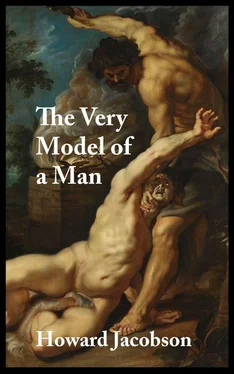Come, he said. Perhaps I only imagine that he said, my son.
Since I couldn’t have out and out contrition, I would have settled for a long sentence. For some sign from him that he at least understood there were long emotions in our vicinity — his and mine — worth trying to make long sentences about. But he was undoubtedly in elemental spirits, his thoughts under the sway of first and last things, and I accepted that I would have to be satisfied with that.
My mother was waiting for me, squatting in shadow, smiling.
Cain, she called. Perhaps I only imagine that she called, my son.
In the few days I had not been allowed to see her (fear of commotion, fear of contamination, fear of pollution: fear, fear, fear), I had disconnected her voice from her body. I had carried the sound of her in my head, could conjure her calling Cain any time I wanted — I still can conjure it, something between a lullaby and a reprimand, a caress and a call to arms — but the actual voice was now not as thrilling to me as the disembodied one; or rather, for it was still the same voice and still enveloped me in its remembered warmth, it let me down by virtue of its location, it failed me in proportion as I could see it, it wasn’t the intimate and dignified and grand a thing that I’d been carrying in my imagination now that it was back where it originated, in her mouth.
In the few days I had been forbidden her I had forgotten what she looked like. She was heavier than I remembered, rounder shouldered, greasier, more lugubriously jowled. I had forgotten that her arms were decorated with bleached bones and phosphorescent feathers to please my father, and that she wore anklets of braided vine, although her ankles were often swollen, perhaps to please God. I had forgotten how plump and creased her wrists were, and that she dyed the nails of her fingers and her toes, and that the sight of a painted nail which was also broken, at the end of a finger or a toe which wasn’t clean, either roused or upset me unaccountably. I concentrated on her extremities because now that it was before me I did not after all want to see what she held to the heart of herself.
Look, she said.
I had forgotten the way her mouth worked. How it always appeared to contain too much moisture or too little, and how she was always mopping up or watering it with her tongue.
Look, she said. Your brother.
I must have advanced, or made some sudden movement, because I recall her shrinking from me and holding out a creased and grimy palm and saying, not too close. Not yet. Just look. Isn’t he lovely? Isn’t he beautiful? Your brother.
At the time I wondered why she was so anxious for my corroboration. Why did I have to say he was lovely? What did it matter whether or not I found him beautiful? Did she lack confidence in her own judgement? Couldn’t he be finally and indisputably lovely in her eyes until I agreed he was? Only later did I understand that it wasn’t confirmation she was after from me at all, but remission. Concede his loveliness to me, was what she was really saying, so that I may be forgiven forgetting yours. I must away on another expedition of the affections: wave me off, with your blessing.
Well? she said. What do you think?
What did I think? I thought she ought not to have had him at her breasts. Whatever needs the positioning answered to in him, or her, or in my father, or in God, I thought it was graphically discourteous to me. Would not the ground have done? Was there not space beside her or between her painted toes? Was there no dying tree for him to be tethered to? Could not my father have dangled him from the fold that gathered plentifully at his blood-red neck? Had she truly wished me to scrutinize him dispassionately, estimate his loveliness and beauty impartially, attach myself to him early as an admirer, were there not a hundred other less indiscreet tableaux of the family she might have struck?
Impelled by an unerring instinct for divisiveness, our Creator created in us the right of choice, and in the exercise of hers my mother chose to force a breast on Abel with her right hand while with her left she simultaneously beckoned me and held me back, saying, look, look, look, look, look, your brother.
I looked. Through crumpled, half-closed, old man’s eyes he looked back. If you are given to fancy you could say we exchanged a salutation, brother to brother, across whatever distance he had still to travel before he could become as young as I was. Then, his curiosity expended, he returned, all mouth, to what all mothers must ensure all mouths desire.
I will kill him, I thought. I will surely have to kill him when the time comes. Or else I must accept what I cannot, that I alone shall have no bearing on his future.
And because my bowels yearned — I could not have said towards whom — and because such a dispersion of sensation, such promiscuity of emotion, was unknown to me and unnamed, I named it love.
* * *
He sits, Cain the wanderer and reciter, the man of crowds and cities, and wipes his face deliberately on the rich, billowing sleeve of his ornate gown. The robe with which God originally clothed his father, to conceal his father’s nakedness, to spare his father’s shame, is said to be in circulation, the subject of wrangling and controversy among connoisseurs and antiquaries. But this is not it. Cain’s costume is costly in the more worldly sense.
He is jewelled, scented and elaborately sandalled. He is known to be particular about where he sets his foot, fearing not just snakes and scorpions but worms, water, soil — the very feel of bare, unreconstituted earth itself. It is said that his medium is marble and his element is artifice and that the exclusion of all stains of nature from his person is his first concern. To this end he carries with him at all times a large square of spotless cambric with which he removes perspiration and emotion from the corners of his eyes and mouth. The billowing sleeve is a purely theatrical device.
He accepts the approbation of his audience without smiling. There are no lines upon his face to suggest where a smile might form. His mouth has a set and waxen look, not sternness suppressing merriment, but an apparent atrophy of the smiling muscles, a stamp of incapacity, an ingrained physical reluctance as incontrovertible as a birthmark.
In the absence of easy, malleable charm, Cain makes a virtue out of intransigence. Notoriously susceptive, the people of Babel find this intriguing, amusing, even enchanting. They attend politely, bolt upright on the mosaicked benches which ring the recital room, sometimes nodding their agreement, as he berates them for their shortcomings as listeners and — since the art he practises is confessional, or at least memoirist — as confidants. He has been in Babel some weeks, but has so far refused to proceed beyond this point in his narrative. ‘You are too eager to discover what comes next to deserve to hear it,’ he has told them.
They will have expected some sign of reassurance from him after this. A shadow of a smile, if not a smile itself. A memory of mirth. But there will not have been the faintest movement around the mouth. Not a twitch. Nothing that necessitated so much as a dab from the billowing sleeve.
They will have laughed at his words anyway, taking them to be clues to a joke, if not exactly a joke themselves. Lacking a serious theology, and therefore humour, the people of Babel are always on the look-out for a joke.
‘You suppose that a story is like a staircase,’ Cain has told them, ‘and that you put your foot on one step for no other reason than that you should gain the next. But where is it that you are going? What is up there which you are in such a hurry to attain? Is it the wisdom that comes with eminence? Is it the beauty of a panoramic view? Or is it, as I suspect, the simple consolation of knowing that what has a beginning has an end? Mere outcome. Yet how can my words leave you in any suspense as to outcome? Behold: I am the outcome.’
Читать дальше











